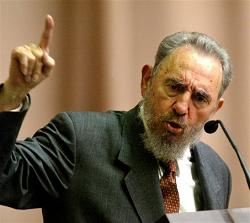
Haiti: We are Sending Doctors, not Soldiers
Fidel Castro

"The head of our medical brigade reported: "The situation is difficult, but we have already started saving lives."
Hour after hour, day and night, Cuban healthcare professionals began working nonstop in the few facilities left standing, in tents, parks or other open spaces, given that the population feared further aftershocks.
The situation was far more serious than was originally thought. Tens of thousands of injured people were clamoring for help on the streets of
United Nations officials were trapped inside their buildings and dozens of lives were lost, including those of several high-ranking officials of MINUSTAH– a United Nations contingent – and the fate of hundreds of other members of its personnel was unknown.
The disaster has shocked the world. People have been able to follow the situation via footage broadcast by the principal international TV channels. Governments from around the world announced the dispatch of rescue teams, food, medicines, equipment and other resources.
In accordance with the position publicly stated by
As it has done in similar situations – like when Hurricane Katrina caused massive devastation in the city of New Orleans and placed the lives of thousands of U.S. citizens in danger – Cuba offered to send a full medical brigade to cooperate with the people of the United States, a country that, as is well-known, possesses vast resources but, at that moment, needed doctors trained and equipped to save lives. Because of its geographical location, the 1,000-plus doctors from the "Henry Reeve" Brigade were mobilized, with the necessary medicines and equipment, to leave at once for that
Neither was that government capable of understanding that our country does not need to beg favors or pardons from those who, for half a century, have tried in vain to bring us to our knees.
Likewise in the case of
These practices have characterized the ethical conduct of our people and, together with their equanimity and determination, have been the constant features of our foreign policy. All those who have been our adversaries in the international arena know that only too well.
In the aftermath of the tragedy, a competition is underway in
The number of fatalities is already in excess of 100,000. An elevated number of citizens have lost arms or legs, or have suffered fractures that will require rehabilitation for tem to work or manage their lives independently.
Around 80% of the country will have to be rebuilt and a sufficiently-developed economy needs to be created in order to satisfy needs according to its productive capacity. The reconstruction of
In the midst of the Haitian tragedy, without anyone knowing how and why, thousands of
Various governments have complained that their aircraft have not been able to land and deliver the human and technical resources that have been sent to
For their part, a number of countries are announcing the additional dispatch of soldiers and military equipment. From my point of view, such actions would contribute to creating chaos and complicating international cooperation, which, in itself, is complex. It is vital to seriously discuss this issue and entrust the UN with the leading role that corresponds to it in this delicate matter.
Our country is fulfilling a strictly humanitarian mission. To the extent of its possibilities, it will contribute the human and material resources at its disposal. The will of our people, proud their doctors and cooperative workers on vital services, is great and will rise to the occasion.
Any significant cooperation offered to our country will not be rejected, but its acceptance will be entirely subordinated to the importance and significance of the assistance required of the human resources of our homeland.
It is only fair to confirm that, to date, our modest aircraft and the important human resources that
We are sending doctors, not soldiers!
Translated by Granma Iternational
Jan. 28, 2010
www.globalresearch.ca/index.php
